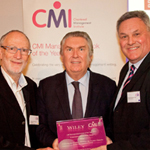 A Coventry University professor’s study on how to build a successful business while maintaining employee wellbeing has been voted the ‘must read’ article of the year by UK managers.
A Coventry University professor’s study on how to build a successful business while maintaining employee wellbeing has been voted the ‘must read’ article of the year by UK managers.
The successful article – entitled Improving the Quality of Working Life: positive steps for senior management teams – was authored by Professor Les Worrall of the University’s Business School in conjunction with Professor Cary Cooper from Lancaster University.
Professors Worrall and Cooper scooped the top prize in the Chartered Management Institute’s (CMI) annual ‘Management Articles of the Year’ competition after members of the institute rated their study as the most valuable to emerge in the past year.
The duo’s article focuses on examining the impact of the recession on UK managers and identifying actions that senior management teams can take to improve the quality of working life for people in the organisations they lead.
In particular the article identifies a ‘cycle of decline’ whereby the UK’s ‘organisational change epidemic’ has led to increased workplace stress, lower motivation and lower productivity. With 82% of change programmes driven by cost-cutting, the study also highlights the increasing prevalence of management styles likely to depress employee engagement – particularly those that are ‘bureaucratic’, ‘reactive’ and ‘authoritarian’.
One of the solutions proposed is to improve the quality of line manager relationships, ensuring line managers are seen to be proactive, take a balanced view of employees that looks at both performance and wellbeing, and involve the worker in setting reasonable, deliverable objectives.
Professor Worrall said:
“In any profession, it is always rewarding to be recognised by one’s peers. I was genuinely delighted that our research has been judged to be valuable and useful by practicing managers and senior business leaders.“As academics we’re increasingly being encouraged to do research that has ‘impact’, and the question of how managers deal with change has a real impact on millions of people in the UK workforce. I hope it will help at least some managers improve how they approach change programmes in the year ahead.”
CMI’s Management Articles of the Year competition aims to bridge the gap between management research and practising managers working in UK organisations by directing time-poor managers to selected articles from the past year which their peers believe will help them and their organisations most.
To read the winning article, please visit www.managers.org.uk/articlesoftheyear.



Comments are disabled